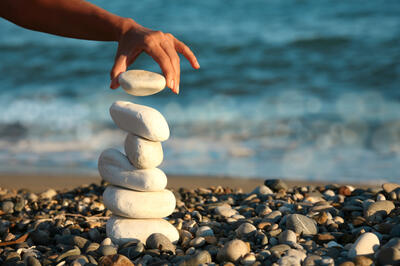

This has been the year of change. We are experiencing unprecedented amounts of fear, uncertainty, hopelessness, isolation, and stress. During these times of change, we all know people (i.e., family, friends, and neighbors) who were forced to close their once-thriving businesses, lost their jobs, experienced economic disruption, and/or experienced some financial insecurity. Many of our daily lives have changed. Some families have been trying to balance home-schooling their children. Many of us have been trying to maintain work-life balance with new "make-shift" work-from-home offices while immediately learning how to use zoom and other video formats in order to resume work and keep socially connected to others.
I thought it might be helpful to repost some helpful things we can do to take care of our body, mind, and spirit. Many of these things listed have been discussed and found helpful with my clients who are trying to navigate stress while adjusting to change. These strategies will be presented in two parts. Part one will include some strategies for times when you feel: overwhelmed, bored, stress, and lonely. Subsequently, part two will include some helpful things to do during times of illness and conflict/dissatisfaction in our relationships. Perhaps you will find a few strategies helpful in your journey to emotional wellness.

If you feel overwhelmed
- Make a list of things that you can control in your life. By writing things down, or putting your thoughts on paper, you may be able to reduce the amount of worry. It can be empowering.
- Make a list of your fears, and then think of ways to be okay if they come to fruition. I call this countering negative self talk or mistaken beliefs strategy the "What Ifs." This is done by asking yourself "What is the worst thing that could happen "...then say to self "so what" or "these feelings won't last forever" or "this too shall pass." Be specific: Instead of stating “People don't like me,” write “I’m afraid or sensitive to other people's impression and I am afraid to be embarrassed or negatively evaluated by other people." Then go to the next step asking "if I have some of these feelings of fear then what?" You will ultimately continue this process of questioning the possible outcome (i.e., the "then what would happen") until you discover that the fear is imagined and tends to increase your stress or be prepared with some possible strategies or solutions.
- Talk to someone about how you’re feeling.

- Start practicing some relaxation techniques. Practice yoga, meditation, focused attention, or pray. Go within. Intentionally focusing on positive inner feelings that are incompatible/replacement with the stress you are feeling from a negative external event. Use these grounding exercises (i.e., pairing incompatible positive inner with negative outer feelings) decrease feelings of stress or anxiety.
- Immerse yourself in a good book as a way to escape or distract yourself from worrying. The goal is always to replace negative with positive thoughts.
- Modify the amount of time you spend on social media or reading other sources of news each day. Moderating the amount of time spent reading allows you more time to engage in more purposeful activities or tasks. Remember you can not control weekly, daily, or hourly life events.
- Exercise to reduce many physical, cognitive, and behavioral symptoms of stress. It may be helpful simply taking a walk or jog around your neighborhood. During times of COVID19, many businesses have been very creative and offering services in video format rather than their traditional brick and mortar buildings. There are a lot of free YouTube videos and a lot of gyms are offering online memberships for video sessions as well.

- Break labor intensive and time consuming tasks into smaller pieces. Set up a more realistic time management schedule. If you , like many families, suddenly find yourself homeschooling your children, don’t expect that you will have the bandwidth to teach them things for 6-8 hours (or that they will have the bandwidth to learn for that long). Instead, focus on one thing a day. Remember, you are perfectly imperfect and doing the best you can.
- Find ways to delineate when you are working and not working. Designate part of your home as your “workspace,” or choose an item of clothing you will only wear when you are “at work.” A friend who used to work from home a lot once told me that she would wear a nice blouse with a scarf anytime she was working and afterwork she would change into pajamas, comfort or leisure wear.
- If your feelings of being overwhelm are related to your membership in an at-risk category (older folks, people with pre-existing health conditions), ask for help from people who aren’t in these groups. Creative social connectedness and networking (i.e., social bubble) are essential to your well being.
If you feel bored

- Take some time to do some of the creative things that you have previously not had time to do and perhaps put it on the back burner. Takes some time to learn/rediscover photography, learn another language, or paint with watercolors, oils, or acrylics.
- Take some time to write poetry, create lyrics to music, a poem, a blog article., or simply journal.
- Do something mentally stimulating, like a crossword puzzle, Sudoku, adult coloring, or use mobile apps that are helpful to cope during uncertain times (i.e., Defense Health Agency (DHA 's) Virtual Hope Box mobile app).
- Learn how to do something new.
- Sing along to Karoke tracks on YouTube, or find a virtual piano bar. Some of my clients mention that they enjoy Apple's Verzuz, the internet battle series that streams live of some of their favorite rap or R&B artists.
- Plan a vacation that you’d like to take once coronavirus is no longer a threat.
- A lot of museums and zoos are offering virtual tours. The Smithsonian National Zoo in DC recently closed on November 23 but, many people enjoy watching the new panda cub, Xiao Qi Ji on webcam. The panda webcam https://nationalzoo.si.edu/webcams/panda-cam.
- Sign up for an online class. I have some senior clients ( age 62+) are able to enroll/audit courses in the Commonwealth of Virginia free of charge. They enjoy taking classes at NOVA, Virginia Technical University, George Mason University, and other commonwealth universities online. If you are a senior check availability in your state. https://www.aarp.org/work/career-change/info-2020/free-college-classes.html

- Read a book. Find something new or reread an old favorite.
- Listen to podcasts or Ted talks, they can be quite informative.
During times of stress

- Listen to your feelings about what feels safe and what doesn’t. If you engage in an activity and feel uncomfortable afterwards, it’s okay to set boundaries. Know what fits and what doesn't fit for you.
- Don’t forget to find moments of joy. Laugh as much as you can. Watch stand-up comedy specials. Reminisce with friends. Sing and dance around your home.
- Remind yourself that during these uncertain times, and as hard as it is to sit with the ambiguity of not having a timeline, and just "be." Just remember, it won’t last forever. Repeating affirmation, or Self-talk, such as "And this too shall pass", "In the meantime," and remembering the three C's."I didn't cause, I can't control it, and I can't cause it" can be helpful.
- Practice self-compassion and be kind to yourself. I often refer to this as self-nurture, self-care. Some things my clients have found helpful include; taking baths, listening to podcasts, listening to music, journaling, doing crafts projects, gardening, cooking/baking, and taking drives out west to the Shenandoah parks area in Virginia or driving over the bay bridge to the Eastern Shore or Delmarva peninsula.
- Spend time outdoors. Creating social bubbles (i.e. safety and social distance) and spending time with family/friends in watching backyard movies, gathering at recently made fire pits, fishing, making vegetable gardens, or walking from Virginia to Maryland over the Wilson Bridge on the 495 Beltway.

- Practice gratitude.during this time of pandemic. Keep of journal of appreciation or non-scaleable victories you have accomplish.
- Take care of health basics: nutritious food, moving your body, getting plenty of sleep, and staying hydrated. Many of us enjoy time for self-pampering with long baths/showers and gym workouts.

If you feel lonely
- Have real vulnerable conversation, I often refer to these conversations as "hard talks" with friends and family. Avoid small talk – it doesn’t fill the feelings of loneliness.
- Schedule Zoom“coffee dates”, Zoom “happy hours”, and Zoom “family gatherings”. (The free account allows unlimited one-on-one time, and 40 minute long group chats.)
- Create something collaborative that can be done remotely.
- Stop scrolling through social media. Counterintuitively, this can make you feel more isolated, not less.
- Have a social distancing get-together with someone in an outdoor space. Sit on separate picnic blankets on the grass, six feet apart, in your car in a parking lot, or take a walk on opposite sides of a track/sidewalk.
- Engage in your community by having conversations with your neighbors – from opposite sides of the street.
- Tell loved ones you feel lonely. Labeling the feeling can help you feel more connected to those around you.
- Call someone and express gratitude to them for something they have done for you.
- If you are young and healthy, practice altruism. Offer to do favors for people who aren’t so fortunate, like picking up groceries for a neighbor who has a health condition or is over 65. Great community building.
- Play online games with loved ones.

Here are five blogs previously posted that may prove helpful.
https://www.drmicheledgoss.com/mindfulness-in-the-meantime
https://www.drmicheledgoss.com/blog/254569-cultural-and-social-isolation
https://www.drmicheledgoss.com/blog/254562-creating-positive-change
https://www.drmicheledgoss.com/blog/254536-coping-with-loss-over-the-holidays
https://www.drmicheledgoss.com/blog/254515-self-nurture-self-care
